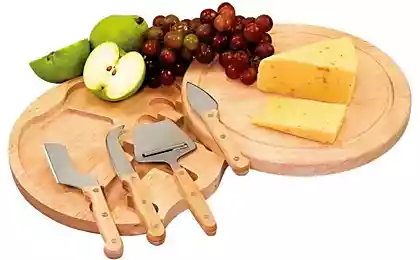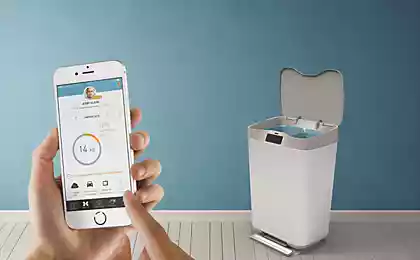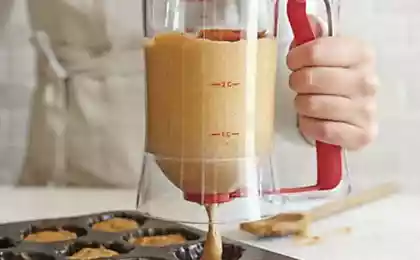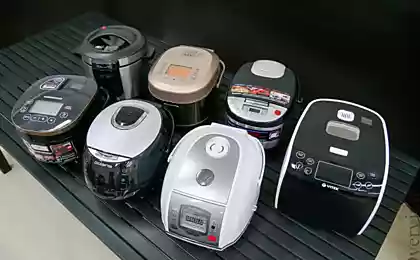209
If you have such a cutting board at home, immediately throw it in the trash, scientists warned about the threat
Turns out, stripboardThe one that many of us have in our kitchen is actually quite dangerous. It's not a joke. The fact that we are used to the fact that something, and such a simple and familiar product simply can not do us any harm. But scientists who simply do not sit still, conducted new research, and their verdict is unequivocal: the boards should be discarded and replaced with something more reliable and harmless.

At first glance, their statements sound like complete nonsense. But let's remember how before, a couple of decades ago, no one would have thought that ordinary disposable cups eventually become toxic. Yes, they had an indication in their name that they should serve no more than once. But who thought about it before? Some even dried them on a windowsill for reuse. And then it turned out that ultraviolet light makes them real time bombs, extremely dangerous for the human body.
So, open the kitchen shelf and see the usual standard plastic board. We bought it for a ridiculous amount, it is easy to wash, by itself it weighs a little and is quite convenient to use. What's wrong? Why should I change a long-loved object for some other, is it not advertising for an hour?

No way. Not advertising. Although this does not negate the fact that plastic board is the worst of the options for daily use. Judge for yourself. Kitchen board we use literally for everything: cut meat, vegetables, fish, greens, cheese. And so on and so forth. In short, for a housewife or housewife, this is one of the basic tools. But due to constant cuts, the surface of the board becomes rough over time. And some manufacturers make it so that the products do not slip.
How dangerous is that? The fact is that even the most diligent home cooks often do not diligently wash the surface of the board from the dirt stuck to it. There it accumulates, new thin microlayers stick on top of it. And all this is enough so that they can multiply different types of bacteria. This is not what we wish for our bodies. Especially if there are small children in the house whose immunity is not yet sufficiently formed.

Peels is just the tip of the iceberg. Many scientists have been talking about the danger for a long time, but everyone is already used to it and no one pays attention to their words. But we would like to mention a new scourge. Specifically, plastic. Or rather, his quality. After all, it is no secret that plastic kitchen boards are the cheapest of the entire line of products. Why? Of course, because of the availability of the material. But if a plastic spatula or ladle is made of food, almost non-hazardous plastic, then on boards most often savvy manufacturers tend to save.
Experiments were conducted on mice. They were fed a reduced amount of plastic that could enter the human body for a year. And here are the results. Even microdoses of crushed plastic can have serious consequences. For example, due to the presence of bisphenol A (BPA) in this material, some mice developed obesity, malfunctions in hormones and even cancerous tumors. Not a fair price for cheap kitchen utensils.

At the same time, a variety of plastic boards of all price segments were taken for research. Plastic is plastic. It does not matter if it is cheaper or more expensive. It's poison to living organisms. This is the news, dear home cookers. Honestly, who knows what chefs use in restaurants? Everyone’s favorite shawarma is definitely cooked on plastic boards. This information has been verified more than once.
What other dangerous things are in your kitchen? Pans and pots. We are talking about damaged dishes with non-stick coating or enamel. The fact that any, even minimal chips on their surface, which is directly in contact with food, emit a huge amount of toxic chemicals. This is very bad for the body and is not recommended at any age. To extend the service life of such dishes, you need to use it when cooking only on low and medium heat. It's even better to use stainless steel. This material is considered the least toxic.

Peels Plastic food containers. They are very convenient for transferring ready-made food to school, work or nature. But over time, they become dangerous, like plastic cutting boards. Their inner surface becomes rough and begins to slowly crumble. And sharp corners do not allow to qualitatively wash the bottom from food residues. It is best to replace such containers with glass and not worry about your own health.
Sponges. They actually need to be changed once a week. Even if you are a single bachelor and do not wash dishes very often. The fact is that after the first washing, some amount of fat and household chemicals accumulate in the sponges. Then it mixes well with the dust, and the sponge itself begins to just infested with bacteria. A used sponge is believed to be the dirtiest place in the house. The surface of the toilet is far away.

The hood. But who can argue with sponges for the primacy of the most contaminated items, so it hoods. A huge amount of fat accumulates on them, to which everything possible will stick. Therefore, hoods should be cleaned as often as possible, otherwise they will negatively affect the respiratory organs of the whole family. Third place stands. dumpster. Of course, only those who do not clean and wash in time. Everyone is used to using garbage bags. But believe me, there are still a huge number of “kitchen Old Believers”.
Results
Returning to the topic of cutting boards, I would advise you to simply use any other materials. Plastic cutting board is a bad option. If it’s wood or bamboo, try not to pick a single piece of material. Let them be glued together, like a chessboard. So the knife will be less dull and will not be able to eventually make a recess in the board, into which dirt will be clogged. It is also better to refuse glass boards. They are inconvenient and very blunt knife blade. And if it is ceramic, write is gone. We hope that our tips will help you choose your option, which will be convenient and safe for your health.

At first glance, their statements sound like complete nonsense. But let's remember how before, a couple of decades ago, no one would have thought that ordinary disposable cups eventually become toxic. Yes, they had an indication in their name that they should serve no more than once. But who thought about it before? Some even dried them on a windowsill for reuse. And then it turned out that ultraviolet light makes them real time bombs, extremely dangerous for the human body.
So, open the kitchen shelf and see the usual standard plastic board. We bought it for a ridiculous amount, it is easy to wash, by itself it weighs a little and is quite convenient to use. What's wrong? Why should I change a long-loved object for some other, is it not advertising for an hour?

No way. Not advertising. Although this does not negate the fact that plastic board is the worst of the options for daily use. Judge for yourself. Kitchen board we use literally for everything: cut meat, vegetables, fish, greens, cheese. And so on and so forth. In short, for a housewife or housewife, this is one of the basic tools. But due to constant cuts, the surface of the board becomes rough over time. And some manufacturers make it so that the products do not slip.
How dangerous is that? The fact is that even the most diligent home cooks often do not diligently wash the surface of the board from the dirt stuck to it. There it accumulates, new thin microlayers stick on top of it. And all this is enough so that they can multiply different types of bacteria. This is not what we wish for our bodies. Especially if there are small children in the house whose immunity is not yet sufficiently formed.

Peels is just the tip of the iceberg. Many scientists have been talking about the danger for a long time, but everyone is already used to it and no one pays attention to their words. But we would like to mention a new scourge. Specifically, plastic. Or rather, his quality. After all, it is no secret that plastic kitchen boards are the cheapest of the entire line of products. Why? Of course, because of the availability of the material. But if a plastic spatula or ladle is made of food, almost non-hazardous plastic, then on boards most often savvy manufacturers tend to save.
Experiments were conducted on mice. They were fed a reduced amount of plastic that could enter the human body for a year. And here are the results. Even microdoses of crushed plastic can have serious consequences. For example, due to the presence of bisphenol A (BPA) in this material, some mice developed obesity, malfunctions in hormones and even cancerous tumors. Not a fair price for cheap kitchen utensils.

At the same time, a variety of plastic boards of all price segments were taken for research. Plastic is plastic. It does not matter if it is cheaper or more expensive. It's poison to living organisms. This is the news, dear home cookers. Honestly, who knows what chefs use in restaurants? Everyone’s favorite shawarma is definitely cooked on plastic boards. This information has been verified more than once.
What other dangerous things are in your kitchen? Pans and pots. We are talking about damaged dishes with non-stick coating or enamel. The fact that any, even minimal chips on their surface, which is directly in contact with food, emit a huge amount of toxic chemicals. This is very bad for the body and is not recommended at any age. To extend the service life of such dishes, you need to use it when cooking only on low and medium heat. It's even better to use stainless steel. This material is considered the least toxic.

Peels Plastic food containers. They are very convenient for transferring ready-made food to school, work or nature. But over time, they become dangerous, like plastic cutting boards. Their inner surface becomes rough and begins to slowly crumble. And sharp corners do not allow to qualitatively wash the bottom from food residues. It is best to replace such containers with glass and not worry about your own health.
Sponges. They actually need to be changed once a week. Even if you are a single bachelor and do not wash dishes very often. The fact is that after the first washing, some amount of fat and household chemicals accumulate in the sponges. Then it mixes well with the dust, and the sponge itself begins to just infested with bacteria. A used sponge is believed to be the dirtiest place in the house. The surface of the toilet is far away.

The hood. But who can argue with sponges for the primacy of the most contaminated items, so it hoods. A huge amount of fat accumulates on them, to which everything possible will stick. Therefore, hoods should be cleaned as often as possible, otherwise they will negatively affect the respiratory organs of the whole family. Third place stands. dumpster. Of course, only those who do not clean and wash in time. Everyone is used to using garbage bags. But believe me, there are still a huge number of “kitchen Old Believers”.
Results

Returning to the topic of cutting boards, I would advise you to simply use any other materials. Plastic cutting board is a bad option. If it’s wood or bamboo, try not to pick a single piece of material. Let them be glued together, like a chessboard. So the knife will be less dull and will not be able to eventually make a recess in the board, into which dirt will be clogged. It is also better to refuse glass boards. They are inconvenient and very blunt knife blade. And if it is ceramic, write is gone. We hope that our tips will help you choose your option, which will be convenient and safe for your health.
The Union has long collapsed, but some Soviet installations still do not allow people to live freely.
Because of the sudden news, I decided to return from a business trip a day early, I didn’t say anything to my husband, but it was a mistake.























